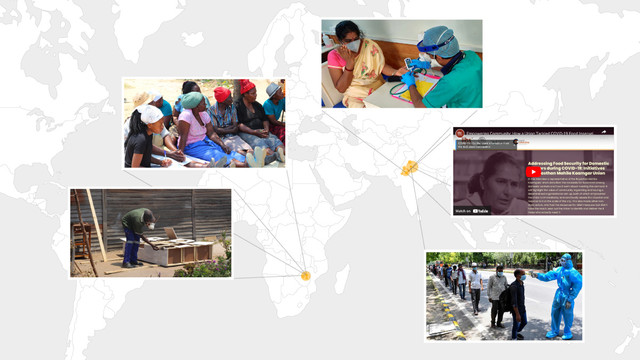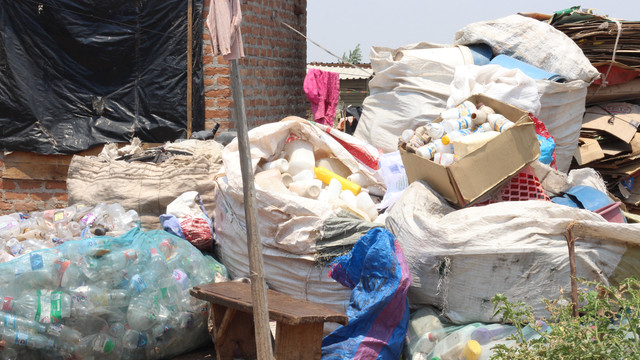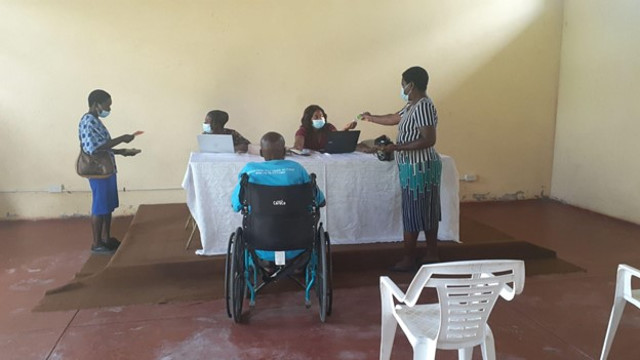‘Building back better’ means ‘building back fairer’ after COVID-19
Karen Wong and Shahrin Mannan draw together insights from grassroots networks on moving towards a fairer world post-COVID-19.



Through local presence and bottom-up decision-making, grassroots organisations allow marginalised communities to strategically respond to inequalities after COVID-19 (Photo: UN Women via Flickr, CC BY-NC-ND 2.0)
A webinar co-hosted by IIED and the International Centre for Climate Change and Development (ICCCAD) earlier this month during London Climate Action Week brought together grassroots networks and social movements to examine how COVID-19 has aggravated multiple pre-existing inequalities for marginalised groups and individuals.
The webinar focused on people living in informal settlements, rural grassroots women and informal workers.
Leaders from organisations including Slum Dwellers International (SDI), Women in Informal Employment: Globalizing and Organizing (WIEGO), and the Huairou Commission shared evidence on how COVID-19 has exacerbated dynamics of exclusion and explained how different types of risks are interrelated.
We asked those who joined the online discussion which inequalities COVID-19 has aggravated; their answers show the multidimensional nature of how ‘inequality’ is understood and experienced.
Different responses, different contexts and challenges
Grassroots networks have been using a variety of strategies, processes and tools to respond to the impacts of the virus. While local and national government and authorities have struggled to deal with the COVID-19 challenge, grassroots networks, already being highly organised, have found ways to help their constituencies cope.
Drawing on grassroots partners’ insights shared during the webinar and elsewhere, IIED has been setting out key lessons from the pandemic that provide grassroots’ visions of change.
From these insights, two common approaches emerge.
1. Structures and processes of self-organisation are essential for orchestrating collective rapid action
Through local presence, bottom-up decision-making processes and proven capacity to self-organise, grassroots networks have provided a dynamic response to the virus.
Communities and constituencies that have gone through processes of self-organisation have networks grounded in principles of mutual trust that make the flow of information and resources more efficient.
When the lockdown occurred, organisations were already well connected. They were able to identify and deliver emergency food and medical aid to vulnerable households. Many set up community kitchens and made door-to-door visits to explain how to prevent the virus spreading, why quarantining is important, and how to access available government support. - Suranjana Gupta, advisor of community resilience at the Huairou Commission
Such organisation at the community level enables marginalised groups to strategically redress structural power imbalances. It also places human dignity and agency at the centre of the action.
Swayam Shikshan Prayog, based in India, works to empower rural grassroots women’s networks and communities through building long-term resilience.
During the pandemic, self-organised rural communities have been able to identify vulnerable households, organise emergency food and medicine to vulnerable households and help disseminate information from the government on how to prevent the virus spreading further.
For informal workers, stronger organisation signifies enhanced collective voice and stronger bargaining power, enabling them to demand policies that work for them.
2. Data and information strengthen advocacy and collective agency
Community-generated data is up-to-date and hyperlocal, and has been used by organised communities and networks to get urgent support to the most vulnerable households. The process itself, of generating and using the information, strengthens individual and collective agency.
SDI’s community-initiated and run censuses (slum/shack surveys and informal settlements profiles, for example) provide communities with the information they need to engage with power holders to negotiate mutually beneficial solutions.
The Huairou Commission’s community mapping allows grassroots women to assess and record community needs and assets, and develop solutions accordingly.
In collaboration with the International Labour Organisation (ILO), the WIEGO global network has produced the first-ever global estimates on the size of informal employment, and used it to support advocacy demands, and to press governments to change the narratives of representation and recognition of informal workers.
COVID-19 has brought us back to basics. Health, food, childcare and schooling are our biggest concerns. We’re reminded of the frontline workers who provide these essential goods and services. – Martha Chen, WIEGO
‘Build back fairer’
Building back ‘fairer’ means explicitly bringing dimensions of justice into a post-COVID-19 world. When the webinar’s panellists were asked about what needs to happen to transition to a better ‘new normal’, grassroots networks leaders referenced different dimensions of justice:
- Recognition: reshaping the narratives of misrepresentation that fuel marginalisation (such as those depicting women as passive recipients, or that stigmatise informal workers) so these groups are instead recognised as active agents of change and drivers of development
- Procedural justice: neatly captured by the maxim “Nothing about us, without us” (central to WIEGO’s New Urban Agenda) involves securing inclusive, participatory decision-making processes, and
- Equitable distribution: where money and power are devolved to where it matters. This involves finding new ways to collaborate across sectors to break silos, solve problems, and facilitate the flow of knowledge and information.
The new fair normal requires the international development community to learn from the experiences of self-organising grassroots networks and recognise what years of collective learning and problem-solving can achieve when crises hit.
It also requires partnering with and investing in community-led solutions, and adhering to a new social contract guided by principles of justice that have agency and human dignity at their core.



